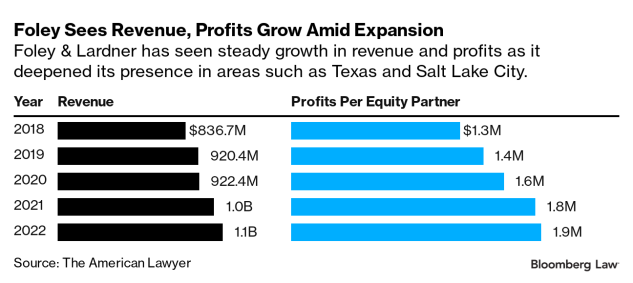- Foley pulled job offer over Israel-Palestine comments
- `We had to make a difficult decision,’ firm leader said
The head of the Big Law firm that pulled a job offer over an incoming lawyer’s Israel-Palestine comments said legal leaders must “make tough decisions at times’’ on acceptable actions by prospective and actual employees.
“You always struggle with what a law firm or a business’s role is in some of these issues,” Daljit Doogal, chief executive officer of Foley & Lardner, said in an interview. “We had to make a difficult decision. I know that other firms are struggling with it.”
Foley is among at least four corporate law firms that have pulled a job offer or fired an employee over public comments after Hamas’ Oct. 7 attack on Israel sparked war in the region. At the same time, college campuses have been embroiled in protests and their responses to antisemitism. University of Pennsylvania President Liz Magill resigned Dec. 9 following a congressional hearing in which she failed to say outright that calling for the genocide of Jews was against school policy.
Foley said Nov. 30 it rescinded a job offer for Jinan Chehade, a Georgetown Law graduate, over comments she had made “about the horrendous attacks by Hamas that were inconsistent with our core values.” The firm did not identify the statements.
Doogal, a Detroit-based corporate lawyer, ascended to Foley CEO in 2022 after two decades with the firm. He said Foley, with 25 locations across the US and more than 1,000 lawyers, has room for a spectrum of viewpoints, though there’s a line the firm must set on acceptable speech.
“You kind of have to figure out where that line is and unfortunately have to make tough decisions at times,” Doogal said.
The firm does not actively monitor what its lawyers are doing on social media channels but sometimes addresses it after “things get brought to your attention,” he said. “Whatever you do at times projects on the firm so you just kind of have to take it as a case-by-case basis,” he said.
Chehade, who was set to start as an associate in Chicago, has claimed the firm wrongly equated her support for Palestine in social media posts with an endorsement of terrorism. She filed a charge with the Equal Employment Opportunity Commission alleging retaliation and discrimination on the basis of her nationality and religion.
“Foley prides itself on diversity and inclusive values, however, I was targeted as the only Arab Muslim hijabi associate,” Chehade said in a statement. “This incident is not exclusive to me but is part of a broader pattern of attacks on people who express support for Palestinian rights or share views critical of Israel’s human rights violations.”
‘Delicate’ Issue
The Hamas attack and the Israeli military assault on Gaza has contributed to a larger debate on free speech on college campuses. Private employers, however, generally have the right to fire someone based on their speech, such as if they believe it risks “reputational harm,” said Domenique Camacho Moran, an employment lawyer at Farrell Fritz.
The issue that “is far more delicate” is when it involves viewpoints couched in a person’s nationality, religion or ethnicity, Moran said. “The concern is we need to be consistent, and it has to be based on a legitimate reason that is not related to ethnicity, race or religion.”
Foley has been forced to respond to lawyer actions before. Following the 2020 election, the firm issued a statement saying it was “concerned” that then-partner Cleta Mitchell was on a call in which President Donald Trump asked Georgia officials to find the necessary votes to flip the state in his favor. Mitchell days later resigned from the firm.
Asked about the upcoming 2024 election, Doogal said the firm has no “guardrails” in place. Big Law firms have generally shunned representing Trump since the 2020 election. Jones Day, the firm most closely tied to the Trump presidency, is no longer representing his campaign.
Senior partners would have to come together and “think about” the propriety of a lawyer being an activist for Trump in his 2024 election bid, Doogal said.
“We tend to be a big tent,” he said. “And we seem to have succeeded well at being able to respect that people are doing different things for their clients and have different beliefs. That’s been one of the fundamental things, understanding that diversity is also diversity of opinion.”
Partner Chris Kise last year left the firm to represent Trump in the Mar-a-Lago classified documents case. Doogal said it was Kise’s choice to leave and that the firm did not tell him he had to go in order to represent the former president.
Kise did not respond to a request for comment.
Mid-Market M&A
Founded in Milwaukee, Foley focuses on manufacturing, energy, technology and health care, with a large proportion of its lawyers based in the Midwest. It also has a deep presence in Texas, thanks to a 2018 merger with Dallas-based Gardere Wynne Sewell.
The firm exceeded $1 billion in revenue for the first time in 2021, according to American Lawyer data, ranking it among the 50 largest in the US. Driving that revenue is a corporate practice specializing in middle-market mergers and acquisition, an area that has continued to see strong demand amid a broader slowdown in the M&A market, Doogal said.
The firm has a stable of mid-market private equity clients, including Novacap, RiverWood Capital and Six Pillar Partners.
While the biggest firms in the legal sector continue to expand in size, engendering fiercer competition for star attorneys, Doogal said that hasn’t had “much effect” on Foley.
He cited Foley’s 2021 entrance in Salt Lake City, where a scrum of firms, including Kirkland & Ellis and Quinn Emanuel, entered to take advantage of the city’s evolution as a start-up and tech hub.
“We were able to attract some really talented people and grow that office,” Doogal said. Foley now has about 30 lawyers in Salt Lake City, he said.
Even so, Doogal is facing a question of whether he’ll follow the wave of Big Law firms raising their associate salary scale to figures ranging from $225,000 to $420,000. Doogal said he had yet to reach a decision.
“We see no reason not to be competitive,” he said. “To be the firm we are and we want to continue to be, you have to attract the best talent.”
To contact the reporter on this story:
To contact the editors responsible for this story:



